General election 2019: Parties stick to core messages in final days
- Published
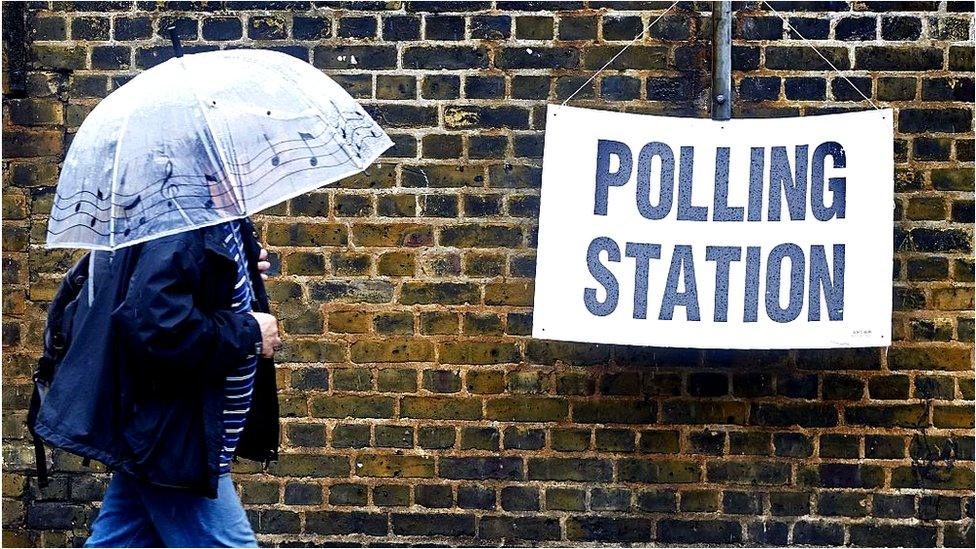
There has been, in truth, precious little subtlety in this most remarkable of election contests. Whether in TV debates or in chilly doorstep conversations, the parties have tended to stick to the old political doctrine.
Preview what you're going to say; say it; then sum up what you've just said. In short, leave as little room as possible for doubt and uncertainty.
The political leaflets have tended to yell at voters in large font typefaces, rather than cajole in measured prose.
I suppose the calculation is that, in these busy, concerning times, there is but a moment to grab the citizen's attention before said leaflet is recycled in obedience to environmental concerns.
In these few, final days, any lingering vestige of subtlety has gone. It is time for core messages. In truth, that has been the case from the outset.
And that is because so much is at stake. In an election, customarily, the loser can find a micro-quantum of solace in the thought that another democratic contest will be around in a few years.
This time, however, there are more fundamental issues at stake. The future of the UK's relationship with the EU - whether as a member or not. Plus, potentially, the future of Scotland.
Party leaders in Scotland have more experience than most of coping with blunt, sharp messaging. And so, mostly, they have honed their offers, bringing past experience to bear upon contemporary challenges.
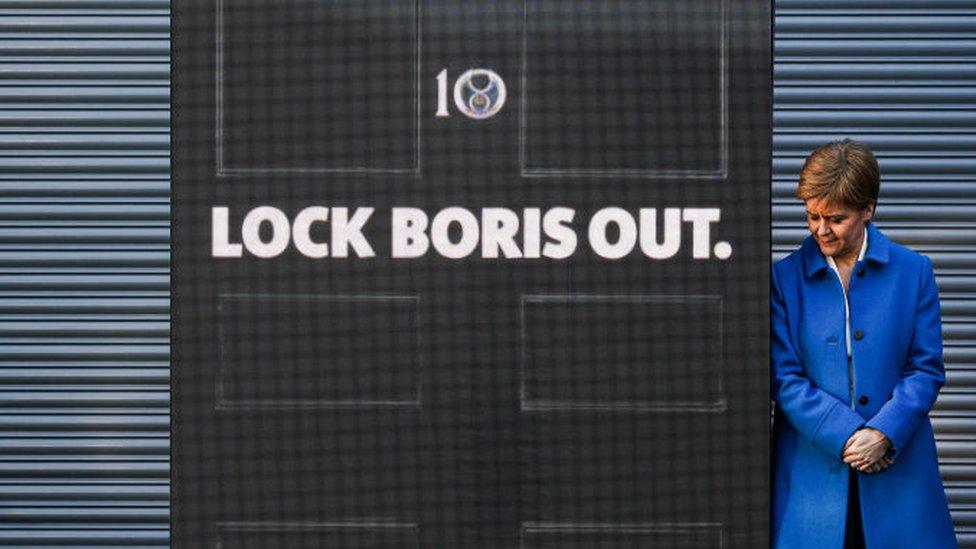
Nicola Sturgeon has highlighted opposition to Boris Johnson in her campaign
Did you catch Nicola Sturgeon on the wireless this morning? I did, not least because I was on just after her to provide analysis.
As is her wont, Ms Sturgeon was disarmingly clear. One objective of the SNP in this contest was to "lock Boris Johnson out of Downing Street".
In which regard, she advances the notion that a Labour government led by Jeremy Corbyn would be obliged to concede indyref2, were they in need of SNP support in the Commons. En passant, Ms Sturgeon offers a degree of nuance, unfamiliar in this contest, in stressing that this she is no particular fan of Mr Corbyn.
It strikes me this is all something of an each way bet by the SNP. It is designed to draw into their corner a combination of opinions. Those who want to Remain in the EU, those who generally favour independence and those who dislike the Tories and/or Boris Johnson.
However, what if the cadre of SNP MPs rises in number, but Boris Johnson still retains the key to Number 10, because of the voting pattern in England?
Why, then the SNP can argue that Scotland's wishes have again been thwarted. They will, in those circumstances, insist that they made every effort to prevent such an outcome - but that Scottish opinion was over-turned once more.
Which leads us to the still more elemental argument adduced by Ms Sturgeon. It is, as I have noted from the outset, a syllogism.
This is to the effect that Brexit is bad for Scotland and contrary to Scottish wishes; that this bad thing arises from Westminster governance; that the UK's handling of Brexit and arguable neglect of Scottish concerns demonstrates that the Westminster system more generally is broken; and thus that the answer to a broken Westminster (and Brexit) is independence, via indyref2. QED.
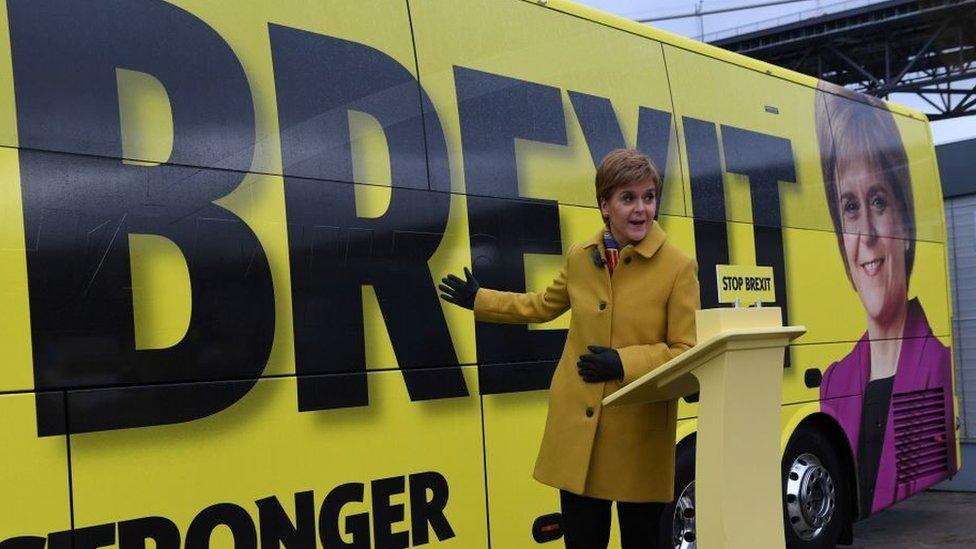
It's not all about Brexit for Nicola Sturgeon, despite the slogan on her bus
This is, to be clear, more than just "Brexit is bad, vote for indy". It is: the system which brought you Brexit is unendurable, vote for the SNP and the option of indy.
Pressed on the wireless this morning, Ms Sturgeon made clear - once again - that her pursuit of independence was not solely linked to Brexit and would not, consequently, evaporate in the event of Brexit being abandoned by an incoming UK government, after a referendum.
She argued that the desire to give Scotland a further opportunity to choose independence was driven by material need and by her perception that Westminster's treatment of Scotland, as evidenced by Brexit, was high-handed and dismissive.
Now, opponents will - once again - argue that this proves the sole objective of the SNP is independence, regardless of other circumstances. Ms Sturgeon will argue that her consistent support for an independent Scotland is scarcely a shock.
The SNP's broader objective in this election is, therefore, to make sufficient progress to be able to argue that there is momentum behind the campaign for a second independence ballot, towards the close of next year.
Again this morning, Ms Sturgeon made clear that she was only interested in a formal ballot, with the necessary UK sanction, which would be legitimate and attract domestic and international recognition.
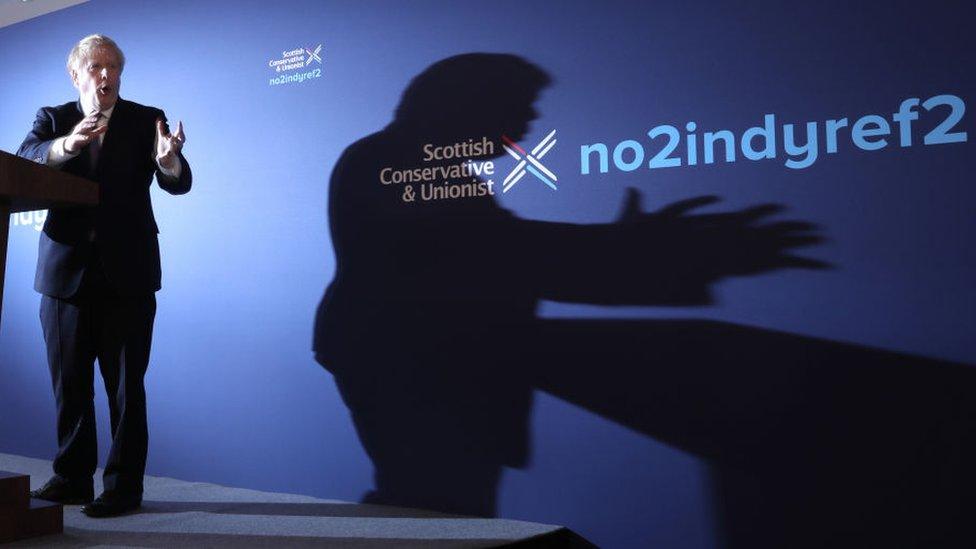
The Conservatives have put opposition to independence at the heart of their campaign in Scotland
And the Tories? Their message in Scotland is rather different from their counterparts in England. Or, to be clear, it contains a distinctive emphasis.
Boris Johnson and each of his Cabinet colleagues preface virtually every remark, no matter the subject, with a re-statement of the necessity to "get Brexit done". In this, they resemble the Roman Senator Cato who argued, every time he got to his feet, "delenda est Carthago" (Carthage must be destroyed).
In Scotland, where folk mostly voted to Remain in the EU, the Tory message is necessarily rather different. Yes, they talk about Brexit. They emphasise the need to move on.
But the legend on the front of their Scottish manifesto is "No to indyref2".
Indeed, Jackson Carlaw made that distinction clear when he was interviewed by the redoubtable Chief Commissioner Miekelson on Scot Squad (motto: "forget the polls, listen to the polis").
In the same interview, all the leaders were asked to characterise various political figures as "bam or no bam". Invited to categorise Boris Johnson, Mr Carlaw said - no doubt, with tongue firmly in cheek - that he "veers between the two".
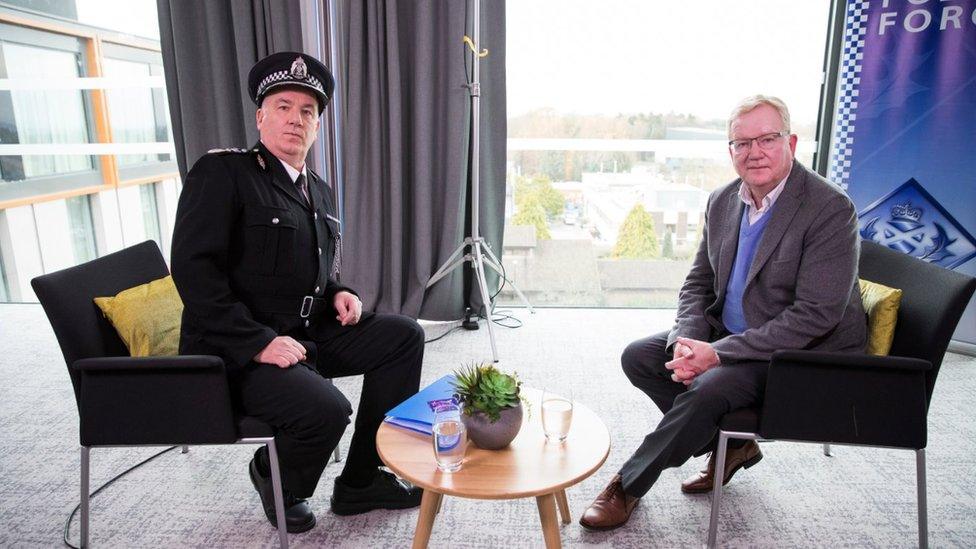
Jackson Carlaw assisting Chief Commissioner Miekelson with his inquiries
Actually, maybe he was simply being drolly candid in this most droll of encounters. The Scots Tories know that Mr Johnson is, potentially, a tricky sell in Scotland. So they steer clear of overt evangelism.
Instead, they make twin pitches.
They have dumped their attempts to mitigate Brexit, explicitly backing Boris on that. And they operate on the basis that Mr Johnson, with a new deal in his pocket, is more likely to carry weight, even with truculent Scots.
More generally, it is a whispered aside, an implicit adoption of Scotland's intrinsic attitudes. Look, they are saying, we know you may be none too keen on Brexit. To be frank, quite a few of us campaigned against it.
But, hey, we need to move on. We need to get past this. And, instead of agonising over Brexit, what about the threat to the Union? That's a big deal for you, isn't it? Isn't it? Bigger than Brexit?
That is why "No to indyref2" is front and centre for the Tories in Scotland. Ahead of Brexit. It is an attempt once again to corral into their corner all voters - Labour included - who prefer the Union to independence. It is an older message, with a new post-Brexit twist.
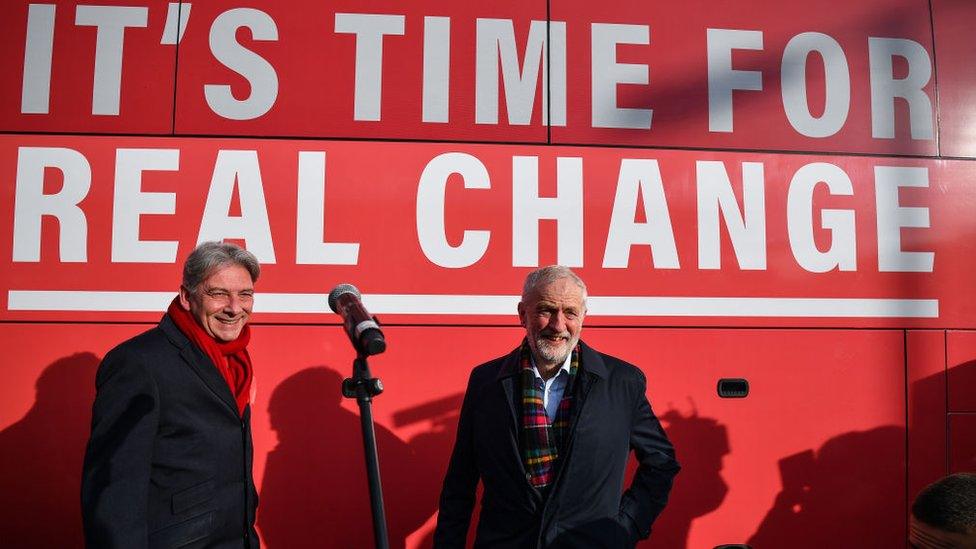
Labour have sometimes struggled to navigate the constitutional divides in Scotland
Then there is Labour. They have sometimes struggled with the constitutional issues in this contest, preferring to stick to topics germane to their potential voter base, such as public services and relative poverty.
In past elections, sundry parties have disavowed constitutional questions. One thinks of the Tories dismissing devolution as a salient topic - right up to the point when they lost every Scottish Westminster seat in 1997.
One thinks of supporters of the Union arguing variously that the SNP have no role in a Westminster contest where, by dint of simple arithmetic, they cannot hope and do not seek to form the UK government.
The SNP have sidelined that argument in this contest with their Brexit-linked syllogism. But, more generally, the constitution looms large and dominant in contemporary politics.
Brexit must be settled - either by proceeding with it or by reversing it. Plus, in Scotland, the issue of independence is to the fore - from its advocates and its detractors.
In vain have Labour occasionally tried to divert focus from these constitutional conundrums. They revive. They resurface.
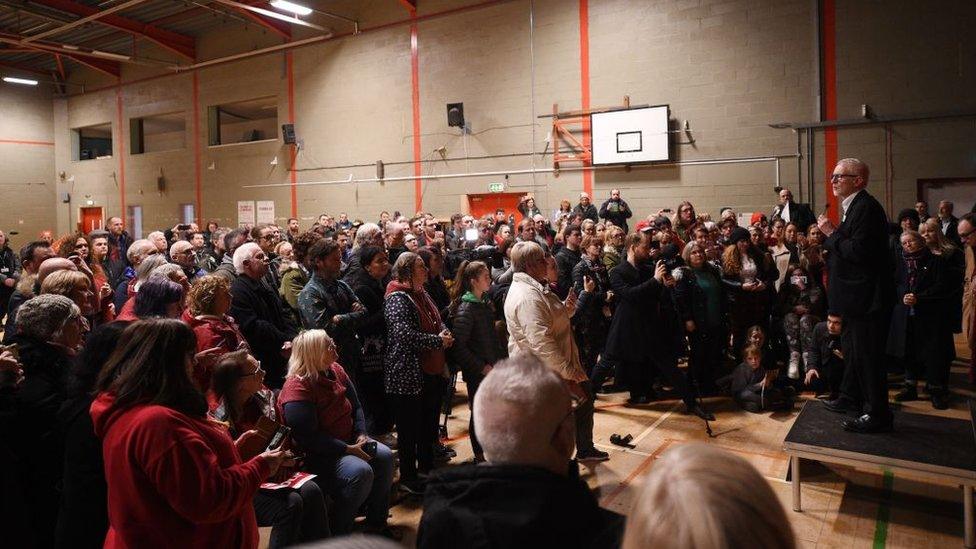
Jeremy Corbyn says he would remain "neutral" in a referendum on a renegotiated Brexit deal
Which has caused Labour transient disquiet. What is their stance on Brexit? A further referendum in which Mr Corbyn hopes to present what he has called a "sensible" renegotiation of the Brexit terms, with the option of Remain also on the ballot paper.
And his position in this referendum? He would be "neutral".
I can readily understand that. Firstly, he is a life-long critic of the European Union. Secondly, he is trying to retain Labour support among Remainers but also in seats in the north and midlands of England which voted Leave. Sundry potential supporters might not welcome guidance from the Labour leader, either way.
However, it leaves him vulnerable to caricature from rivals, including from the Tories who have taken to arguing in favour of "getting Britain out of neutral". A phrase deployed almost as frequently as "get Brexit done" or "no to indyref2".
And independence? Labour is agin it. But then notes that it might be prepared to contemplate indyref2 after two years of a Labour UK government. In short, after the next Holyrood elections in 2021.
The party's Scottish leader, Richard Leader, has coped valiantly with this. On Brexit, he says the Scottish party would campaign for Remain, despite Mr Corbyn's stance. On indyref2, he says he expects to be first minister after 2021, and so the issue won't resurface.
But it has been a challenge.
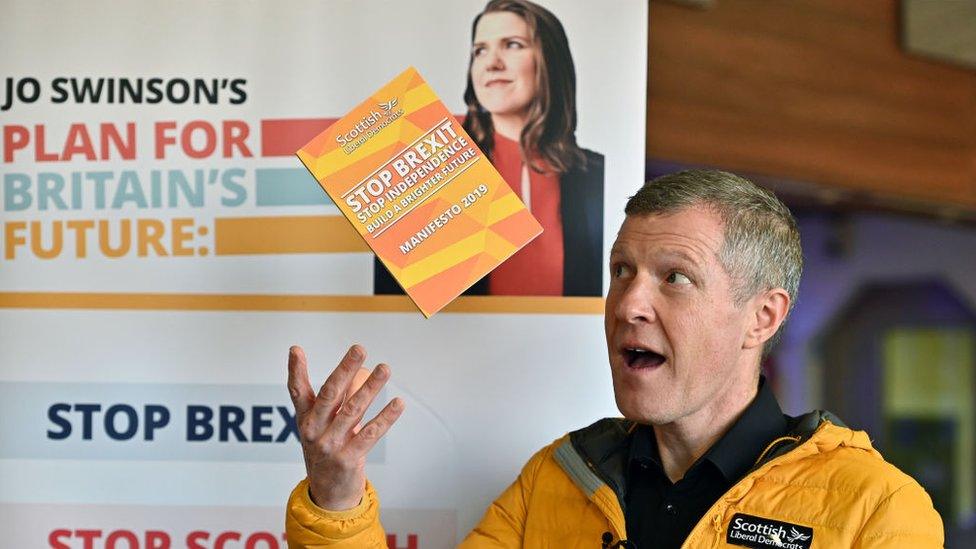
The Scottish Lib Dems are opposed to both Brexit and independence
And then the Liberal Democrats. They deliver a firm no to both Brexit and indyref2. Keeping it simple in these most complex of times.
Willie Rennie, leader of the Scottish Lib Dems, has restated this dual commitment in all circumstances. It's a no. Twice.
Indeed, Mr Rennie has contrived gallantly to keep a straight face as he has argued that his party - the party of PR voting, the party of political reform - wants to get off the obsession with constitutional matters.
They have stumbled a little over two related issues. One, the declaration by Jo Swinson, the federal leader, that she was out to be prime minister. Two, the suggestion that they would simply cancel Brexit should they have majority power.
To be fair to Ms Swinson, she was disinclined to place early limits on her party's ambitions. Perhaps she might have found a more nuanced way of saying it. "We're standing in seats across GB. And, you know what, if folk vote for us then I could end up PM! What about that, eh?"
But some, even in her own party, think that the promise to drop Brexit through revoking Article 50 was a little too courageous, even in this polarised election.
Perhaps, some think, they might have been better to stick with the promise of a further EU referendum - with a vigorous Remain campaign. Especially as the revoke message - which allowed critics to pounce - was predicated upon the relatively unlikely scenario of majority Lib Dem power.
In practice, they've talked up the referendum, anyway.
Scottish Lib Dem strategists insist their stance sets them apart. That folk on the doorsteps or watching telly hear a party which is ineluctably opposed to Brexit - and vigorously in favour of the Union that is the UK.
And there's more. The Scottish Greens advocating environmental concerns, with an energetic campaign. The Brexit Party, perhaps less visible in Scotland, advocating what they call a "clear break" departure from the EU, with no extension to the transition period.
And the others. All those candidates clamouring for your support in this curious, curious election.
